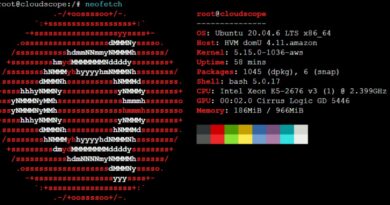How to Install Wine on Ubuntu 20.04
Are you an Ubuntu Server user looking to run Windows applications seamlessly on your Linux-based system? Look no further! In this step-by-step guide, we’ll walk you through the process of installing Wine on your Ubuntu Server.
Wine is a compatibility layer that allows you to run Windows applications on Linux, making it an important tool for users who need access to Windows-specific software on their Ubuntu Server.
1. Login to the Ubuntu server and become a root user
# sudo su
2. Verify Ubuntu 32-bit or 64-bit system
Wine uses different application for 32-bit and 64-bit versions of Ubuntu
# lscpu
The “CPU op-mode(s)” field can display one or more modes that describe the CPU’s capabilities, In our case the CPU op-mode(s) has 32-bit and 64-bit.
This means that the CPU supports both 32-bit and 64-bit operating modes, allowing it to run software of both architectures.
root@cloudscope:~# lscpu
Architecture: x86_64
CPU op-mode(s): 32-bit, 64-bit
Byte Order: Little Endian
2. Update the server
Before installing any new software, it’s a good practice to update your package lists to ensure you’re getting the latest available updates from the repo.
Run the below command and Press ‘Y’ to start the Update && Upgrade process
# apt update && apt upgrade
3. Install Wine from default Ubuntu repository
To install wine of 32-bit architecture on 64 bit OS, first enable the 32 bit architecture by running the below command
# dpkg --add-architecture i386
# apt install wine32
To install wine on 64-bit architecture, run the below command
# apt install wine64
Verify Installation
# dpkg -L wine
root@cloudscope:/# dpkg -L wine
/.
/usr
/usr/bin
/usr/bin/wine-stable
/usr/lib
/usr/lib/wine
/usr/lib/wine/wineapploader
/usr/share
/usr/share/bug
/usr/share/bug/wine
/usr/share/bug/wine/control
/usr/share/bug/wine/script
/usr/share/doc
/usr/share/doc/wine
/usr/share/doc/wine/README.Debian.gz
/usr/share/doc/wine/README.winedbg.gz
/usr/share/doc/wine/TODO.Debian
/usr/share/doc/wine/copyright
/usr/share/doc/wine/examples
/usr/share/doc/wine/examples/wine.desktop
/usr/share/icons
/usr/share/icons/hicolor
/usr/share/icons/hicolor/scalable
/usr/share/icons/hicolor/scalable/apps
/usr/share/icons/hicolor/scalable/apps/wine-stable.svg
/usr/share/man
/usr/share/man/de
/usr/share/man/de/man1
/usr/share/man/de/man1/wine-stable.1.gz
/usr/share/man/de/man1/wineserver-stable.1.gz
/usr/share/man/fr
/usr/share/man/fr/man1
/usr/share/man/fr/man1/wine-stable.1.gz
/usr/share/man/fr/man1/wineserver-stable.1.gz
/usr/share/man/man1
/usr/share/man/man1/msiexec-stable.1.gz
/usr/share/man/man1/regedit-stable.1.gz
/usr/share/man/man1/regsvr32-stable.1.gz
/usr/share/man/man1/wine-stable.1.gz
/usr/share/man/man1/wineboot-stable.1.gz
/usr/share/man/man1/winecfg-stable.1.gz
/usr/share/man/man1/wineconsole-stable.1.gz
/usr/share/man/man1/winedbg-stable.1.gz
/usr/share/man/man1/winefile-stable.1.gz
/usr/share/man/man1/winepath-stable.1.gz
/usr/share/man/man1/wineserver-stable.1.gz
/usr/share/man/pl
/usr/share/man/pl/man1
/usr/share/man/pl/man1/wine-stable.1.gz
/usr/share/metainfo
/usr/share/metainfo/org.winehq.wine.appdata.xml
/usr/bin/msiexec-stable
/usr/bin/regedit-stable
/usr/bin/regsvr32-stable
/usr/bin/wineboot-stable
/usr/bin/winecfg-stable
/usr/bin/wineconsole-stable
/usr/bin/winedbg-stable
/usr/bin/winefile-stable
/usr/bin/winepath-stable
/usr/bin/wineserver-stable
/usr/share/doc/wine/NEWS.Debian.gz
/usr/share/doc/wine/NEWS.gz
/usr/share/doc/wine/changelog.Debian.gz
4. Check version
# wine --version
root@cloudscope:/# wine --version
wine-5.0 (Ubuntu 5.0-3ubuntu1)
5. Uninstall wine
# apt remove wine
Conclusion
In this post, we’ve demonstrated how to install Wine on our Ubuntu Server to enable the smooth running of Windows applications. Wine provides a valuable solution for users who rely on specific Windows software while benefiting from the robustness and stability of Ubuntu Server.




